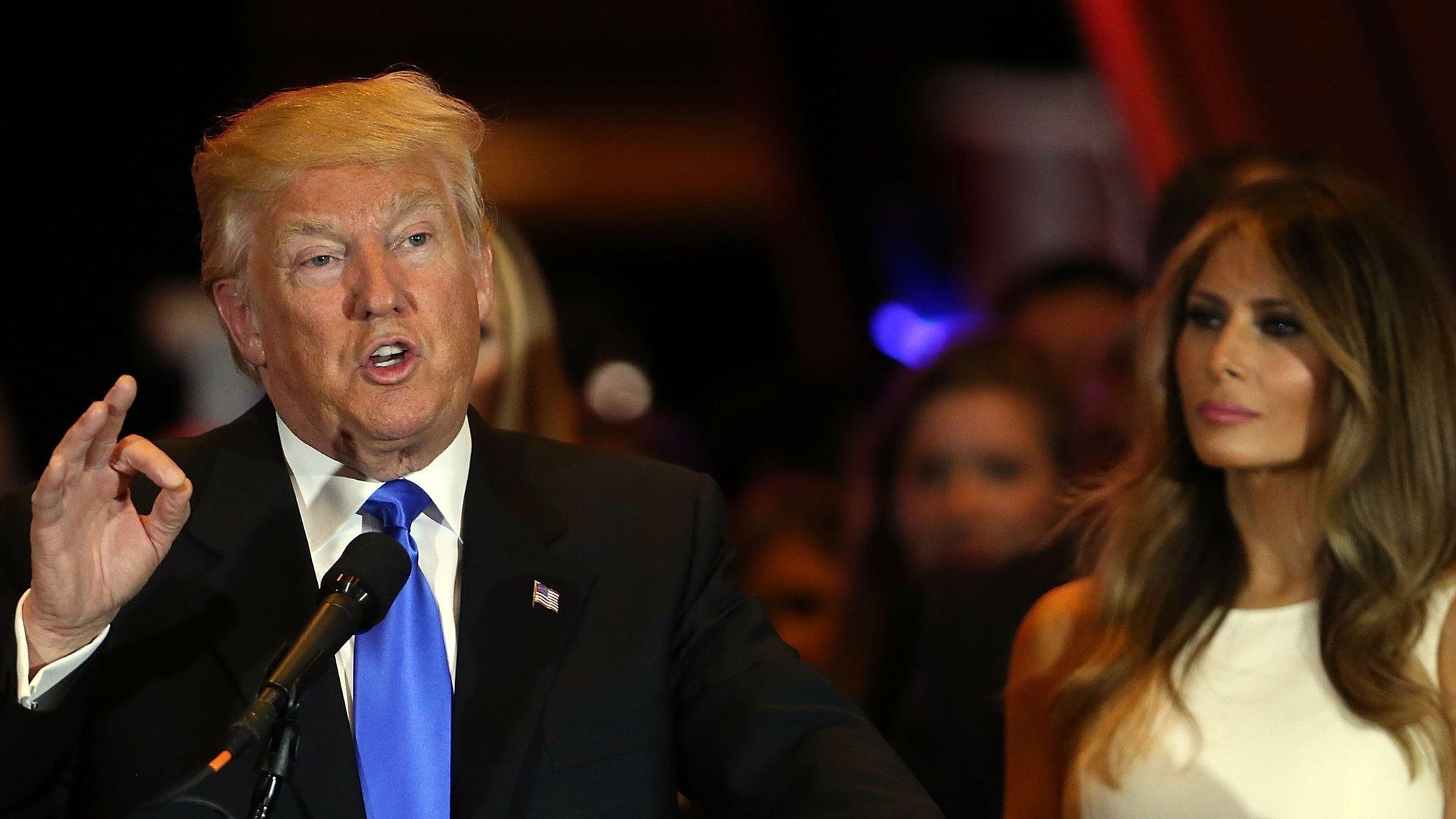US election 2016: Can Trump surf a wave of discontent to top job?
- Published
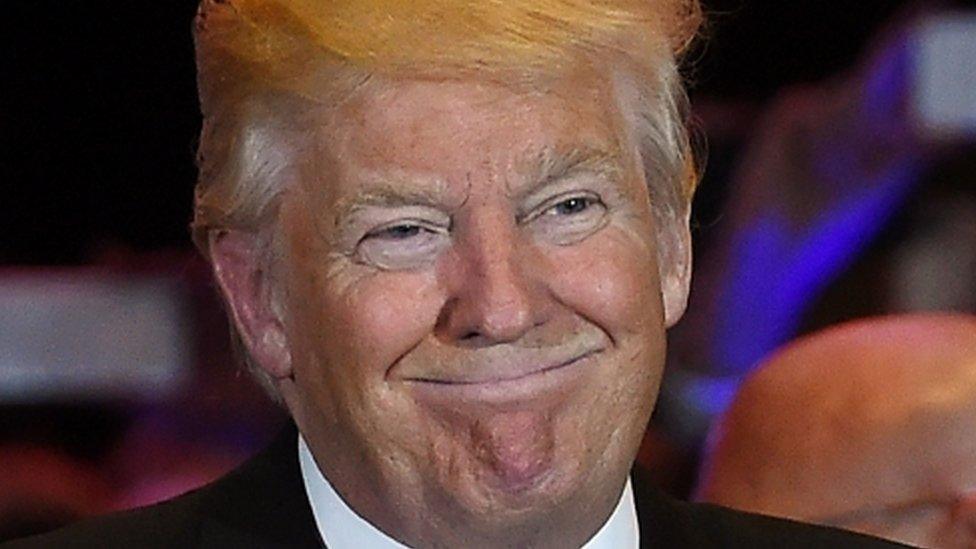
Could Donald Trump win, not just the Republican nomination, but the presidency itself?
The assumption is that Hillary Clinton will win: but I am not so sure.
It wouldn't be the first time a non-politician has taken the biggest political job the world has to offer.
Dwight Eisenhower and Ulysses S Grant were popular soldiers and Herbert Hoover was a millionaire mining magnate, who put in time as a public servant of a very grand kind - feeding Europe after World War One.
Moreover, their lack of electoral experience was more an accident than the basis of their appeal.
What will Clinton v Trump look like?
Will normal rules ultimately apply?
How Trump defied all predictions
How Donald Trump compares to Ronald Reagan
This time it is not really about one guy, rather the wave he is surfing - one that could still wipe out Hillary Clinton.
I was in Baltimore in 2011 when Trump, the billionaire TV superstar, first tried out his political chops., external
The call came in that President Obama had dignified an apparently ludicrous, long-running, allegation with a reply, because it came from someone famous.
Time for us to switch stories. We had been doing a piece ahead of the election on the state of the local economy.
It wasn't a very impressive entry into mainstream politics - rather late in the day he was picking up an argument that had long existed on the fantastical fringe, external of US politics, that President Obama wasn't really born in the US, external - and thus should be expelled from office.
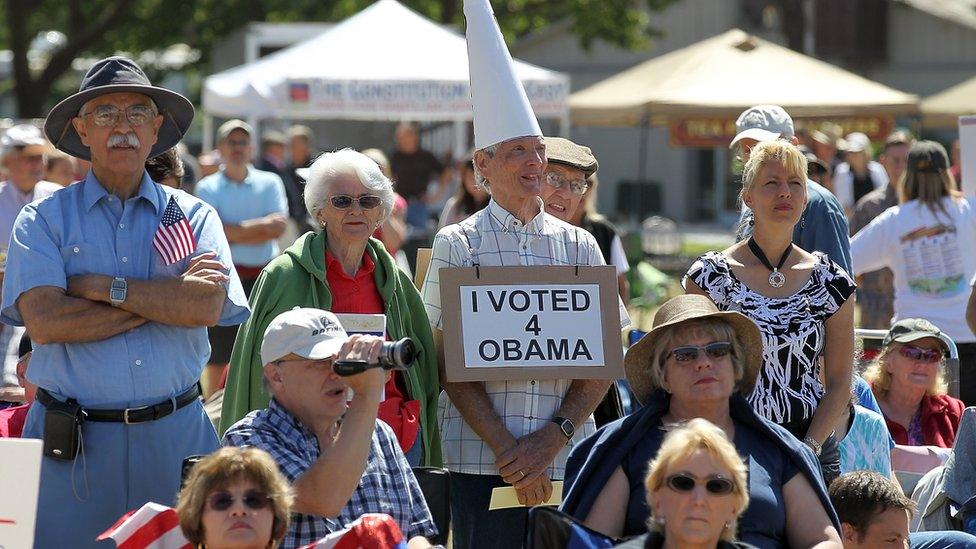
The Tea Party has remodelled US politics
It was the sort of toxic stew of conspiracy theory and casual racism of which any sensible politician would steer well clear.
Trump, by his first political act, declared himself not a sensible politician, deliberately courting controversy by staging a hit-and-run on the facts. But some loved it, seeing Trump as raw and fresh.
The high roller, the booster, the snake oil salesman is the trickster of US national myth and there is a not-so-sneaking admiration for a flash clever clown who pulls down the establishment's pants.
The story soon died its own death and Trump went away for a while.
But what is happening now is a culmination of the most fascinating story of my time in the US. It is one that should worry Clinton deeply.
While I never guessed Mr Trump's trajectory, I was well aware of the simmering discontent that got him this far.
Tea Party impact
The Tea Party burst upon the scene shortly after Obama's first election win.
While many thought that in recent years they were a busted flush, the truth is they had already won, by remodelling the Republican party in their own image.
Yes, it was new, but it was also a home for much older conservative trends in an already pretty conservative party.
It was also the tip of an iceberg. A tip that could hole candidates below the water line if they were branded Rinos - Republicans in name only - and a tip that sometimes reflected the socially conservative regiments in America's culture wars.
But Ted Cruz was their candidate and he has gone. What Donald Trump has is "tea party plus" - not just the ideologically pure commitment to right wing conservatism, but a broader, less coherent feeling that reflects both a deep strand in US politics and a growing global zeitgeist.
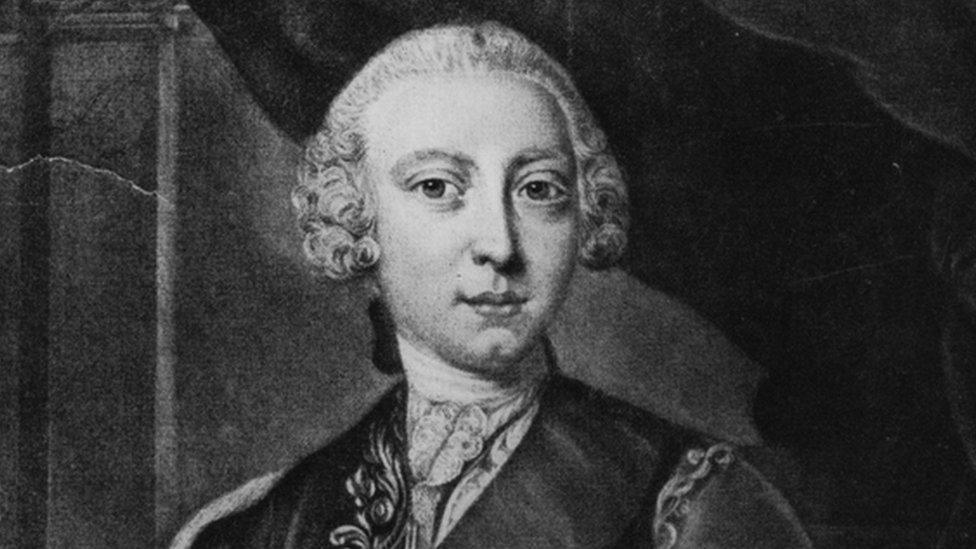
George III: Responsible for the rise of Donald Trump?
You can argue it is in part George III's fault: a legacy of British colonial rule.
The current deep disillusionment with mainstream politics and politicians in the States, is mixed up with a revulsion for the very idea of government - a concern that without constant vigilance, tyranny will triumph.
This suspicion of rulers is at the heart of the US constitution - producing a deliberately elaborate system of checks on over-mighty power which can produce sclerotic government.
This paralysis adds fuel to the feeling that politics is broken, not fit for purpose.
This impatience can end in paradox, with a craving for strong simple rulers who hark back to glories gone, and glories yet to come, while denouncing the uncomfortable reality of now as compromise and betrayal.
It translates into a widespread loathing for Washington - a place built on a swamp, where dodgy deals are done, weasel words spoken and the people scorned.
Thus the apoplectic, apocalyptic appeal of Trump: a Bronx cheer of a clarion call, vulgar and angry, sounding rich and glorious to many ears.
Clinton's battle
The assumption among most commentators, after a few throwaway lines about their lack of a crystal ball, is that the race for the White House will now be between Trump and Clinton.
The further assumption is that she will emerge victorious, as the sober middle swings her way, unlikely to mistake him for an angel. But will she?
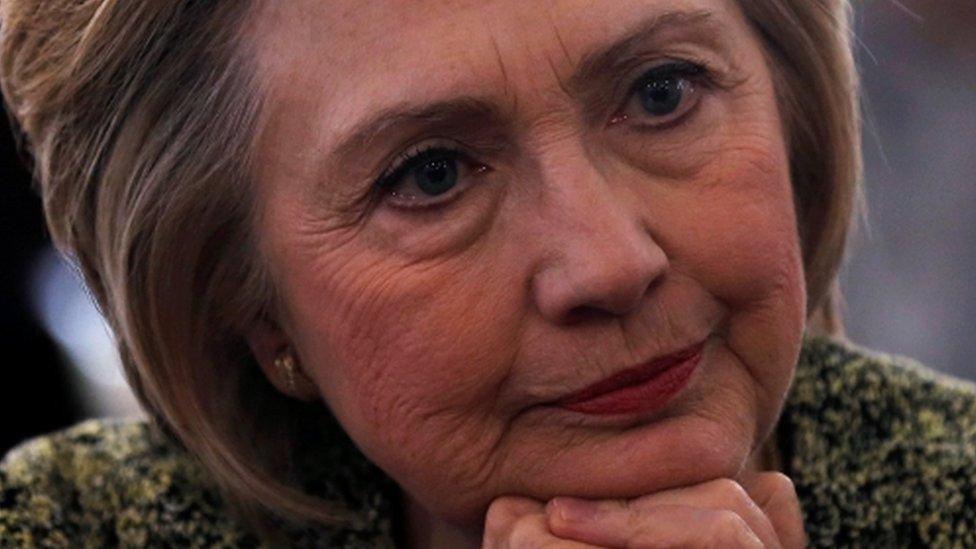
Hillary Clinton may still face a tough fight for the presidency
She of course is still facing the Democrats own insurgency, the unlikely infatuation of the young left, external with an old socialist, Bernie Sanders.
He, too, is excoriating about the existing system, about the power of Wall Street money in Washington and the failure to deliver for most people.
Never forget Obama beat Hillary riding popular discontent with the same old system, same old faces and above all a feeling someone fresh and different could change it all.
It is assumed, if Bernie Sanders bows out, his supporters will grudgingly switch to Hillary. But some many not - some may prefer an anti-establishment candidate. Any anti establishment candidate.
By then there would only be one on offer. It may seem like an unlikely switch, but in British elections there is huge churn - much evidence over the last 10 years of left wing labour voters moving to the Lib Dems and then UKIP. It is not a move from left to right, but a quest for "none of the above".
The assumption is that, faced with a clear choice, the US people will plump for one who is not a clown.
That may be the case. But Hillary Clinton has a battle on her hands, not against a man, but a mood., external
There are few people who embody "Washington" in the way Hillary Clinton does.
Made wealthy by politics she is a former first lady, former senator, former presidential candidate and a former secretary of state.
It is an impressive CV, if you are impressed by someone who knows the ropes - less so if it is the very ability to nimbly nip around the rigging that puts you off a candidate.
It makes for a critically important contest - the bad news is it is even more important than that.
Rise of the rest
The deep fault lines in US politics have got a little deeper in this contest. The losers will not feel like forgiving or forgetting their defeat.
The presidential victor will have to cope with a mood that is more than just a local malaise. It is, in part, a blowback of globalisation: not just about jobs and trade deals, but about a sense of lost worth that is likely to get more acute as the century unfolds.
Part of the appeal of the Tea Party, and Trump, is a dismay about the US's standing in the world.
Although the US is the strongest military power the world has ever known and is still the biggest economy in the world, it is a feeling that the glory days are over, as the West is threatened by the Rise of the Rest.
It is hard to maintain the US's status in a world where others, especially China, will become richer and more assertive.
Those who have long assumed their superiority feel displaced and discomforted and are casting around for assurance that the unforced dominance of the 20th Century isn't over.
Managing a fractious public mood will require some bombast, but discontent may grow whoever ends up in the White House - whether practised politician or untested populist.

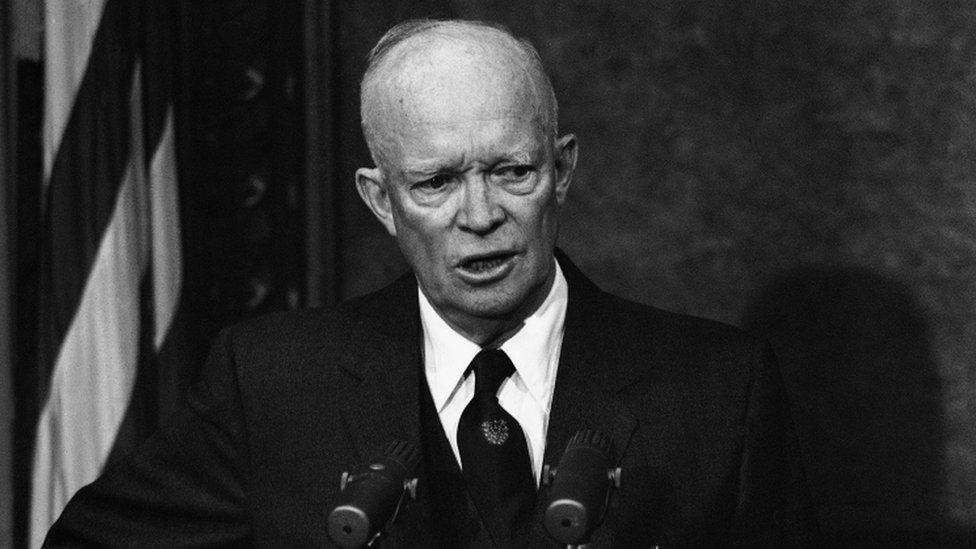
President Dwight Eisenhower is widely viewed as a successful president
Presidents without political experience
Zachary Taylor (1849-1850)
A career officer in the US Army, rising to the rank of major general, and becoming a national hero after victories in the Mexican-American War, provoked by the US annexation of Texas, culminating in the Battles of Palo Alto and Monterrey.
This propelled him to the White House, representing the Whig Party, despite having no clear-cut political beliefs.
His top priority was to preserve the Union, but he died 17 months into his term before making any progress on the controversial issue of slavery, which would trigger the Civil War a decade later.
Ulysses S Grant (1869-1877)
Led the Union Army to victory over the Confederacy in the American Civil War. He became president less than four years after accepting the surrender of Confederate leader Robert E Lee.
A West Point graduate and a veteran of the Mexican War, he switched to farming and business before rejoining the Union Army at the start of the Civil War in 1860.
As president, Grant became notorious for promoting his friends to high office - "Grantism" came to mean political corruption.
In 1880, Grant failed to win the Republican presidential nomination for a third term.
Dwight Eisenhower (1953-1961)
Supreme Commander of Allied Forces in World War Two.
He was initially pressed to stand as a Democrat in succession to Harry Truman, before declaring himself to be a Republican.
Although lacking political experience, Eisenhower's two-term presidency is generally well-regarded by historians.
He successfully resolved the Suez Canal crisis in 1956, refused to involve the US in Indochina, established the NASA space agency, and the Interstate Highway System and signed the Civil Rights Act of 1957.

- Published4 May 2016
